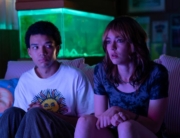

At first, this amiable documentary from Chile appears to be a hilarious spy spoof in the making. During early scenes set to music resembling the James Bond theme, a middle-aged private eye, Rómulo, interviews octogenarian men to go undercover at a nursing home to verify whether a client’s mother is being abused. The top candidate, Sergio, has advantages over the competition. Besides his seemingly intact faculties, he lives independently. (Whoever gets the job must separate from family for three months and live in the home.)
This is not to say Sergio is ideal; he struggles mightily with a smartphone as well as the espionage equipment provided by Rómulo, including glasses that record whatever the wearer sees, which Sergio can’t use without looking awkward. But no matter. As he explains to his grown daughter, he needs to shake things up personally. He’s tired of spending his days walking outside aimlessly or poking around at home, where the memories of his late wife, who passed away just four months earlier, are always waiting for him.
The action shifts to the nursing home, where neither the employees nor residents have any idea a “mole” has been planted in their midst. (Director Maite Alberdi had convinced administrators to let her make a movie about day-to-day life there, and so they pay no mind to the camera crew constantly wandering the grounds.) Almost instantly, Sergio causes a stir among the women, who outnumber the men nearly tenfold. One of them develops romantic designs for the handsome and kindly widower, although he seems to care more for another resident who is having memory issues and doesn’t remember if her family visits her.
Alas, the answer is most likely no. The residents have largely been abandoned by their loved ones, a problem that soon becomes more important to Sergio than his original mission. Rómulo wants facts and evidence proving whether the facility has been negligent, but what he gets back are daily reports that are more stream-of-consciousness, lamenting what happens when we grow old and infirm. Much of the tension arises from Rómulo’s insisting Sergio keep as low a profile as possible, but on the contrary, Sergio only becomes more involved in his fellow residents’ lives.
The film greatly benefits from this as the other residents come across with more depth. Take Martita, who is clearly suffering from mental decline. When we first meet her, she is standing behind the locked gate of the nursing home, asking random strangers if they will take her home. Later, she becomes a suspect when items are missing from residents’ rooms. In a different kind of film, the senility would be Martita’s excuse for the thievery, but thanks to the intimacy Sergio develops with her, she opens up about her true motivations, and what we end up feeling for her is less pity and more understanding.
Speaking of defying expectations, the freewheeling tone initially adopted by Alberdi eventually turns poignant, but the change never feels so drastic thanks to Sergio, who brings a sense of dignity that grounds the film throughout. In hindsight, there’s much about him that we never find out, but those details also don’t matter: he serves as a stand-in for the audience. What is relevant are his decency and empathy. The way he reacts is how we would hope to if we were in his shoes.
Interestingly, a large chunk of the first act involves a lengthy conversation between Sergio and his daughter, who doesn’t appear much afterwards. Yet we remember those moments of mutual concern and caring, and as the loneliness in the nursing home becomes more obvious, we realize that connectedness is what sets Sergio apart from the others, and is quite possibly the source of his strength.
The elderly aren’t always treated well by the movies, which all too readily poke fun at the indignities of growing older. This makes The Mole Agent all the more noteworthy. Even when the aforementioned character who becomes enamored with Sergio makes a fool of herself for love, the filmmakers give her space to collect her feelings and walk away with her self-respect intact. The film also shines a light on how one society could treat its elderly better, and these scenes are likely to resonate with audiences beyond Chile. Above all, it’s a humane effort at advocacy for seniors everywhere.






Leave A Comment